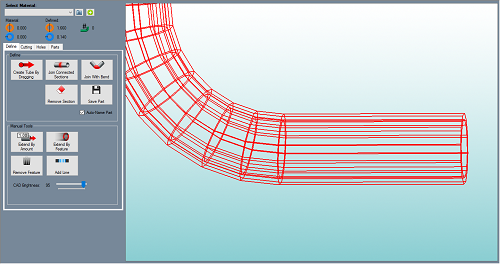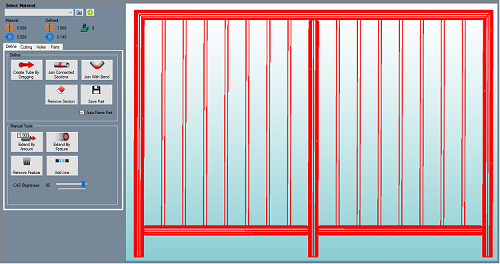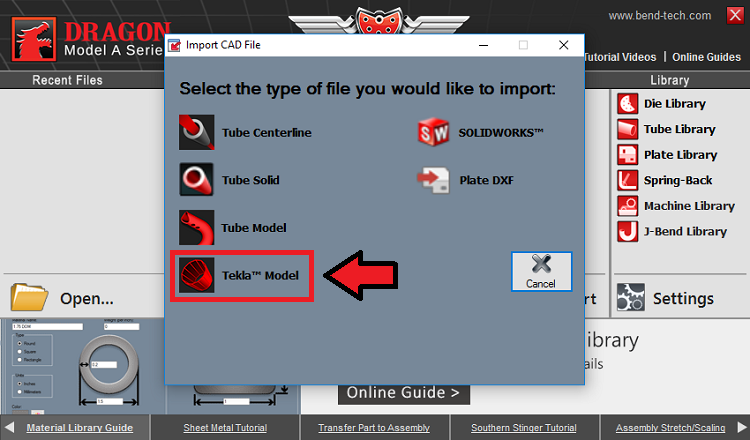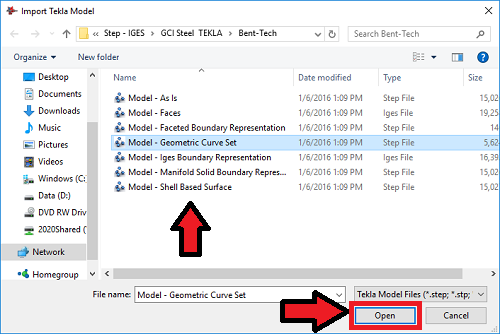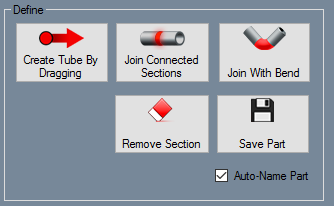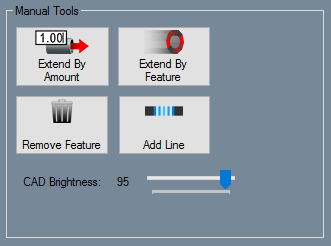Tekla Import Guide
Bend-Tech's Tekla importer is useful for customers with .step and .iges file types that contain a boundary representation of the tube model. These file types are exported from the Tekla software programs. Examples are illustrated in the pictures below.
Contents
Tekla Import Access
- To access the Tekla Model Importer, select the CAD Import Menu
 from the Task Menu and select the Tekla Model
from the Task Menu and select the Tekla Model  option from the list.
option from the list.
Open a Project
- Select a file from the list and click the Open button to open it in the Tekla Import screen.
Material Definition
1. The Select Material: drop down menu will be grayed out until the user has fully tracked the imported part. Once the part is tracked, it will need to be assigned a material which matches its Defined: outer diameter and wall thickness.
2. If a material is not set up in your material library that will match the imported part, clicking the Plus: ![]() button will add the imported material for you and assign it to the current part or project.
button will add the imported material for you and assign it to the current part or project.
3. The Material: section will show which material is chosen from the Select Material: drop down menu above. The Outside Diameter (OD) of the material will be shown next to the orange icon and the Material Wall Thickness will be shown next to the blue icon.
4. The Defined: section will show which material is applied to the part after importing. The detected Outside Diameter (OD) of the material will be shown next to the orange icon and the detected Material Wall Thickness will be shown next to the blue icon.
5. The number of bends detected in the part will be shown next to this icon.
Define
Define Section
- In the Define section of the Tekla Import screen, users will be able to use the following basic functions in order to define their part in preparation for use in the Bend-Tech software. After each part is fully defined, it can then be saved to the Parts tab before it can be transferred to one of our other designers.
Create Tube By Dragging:
Click the Create Tube By Dragging  button, then click and drag your cursor of your mouse over any straight section of tubing that you'd like to define. IMPORTANT: This works best if you refrain from including bends, zoom in close to your intended tube, and drag the line in a direction that runs opposite of the length of tubing you are trying to define. See the illustration below for more detail.
button, then click and drag your cursor of your mouse over any straight section of tubing that you'd like to define. IMPORTANT: This works best if you refrain from including bends, zoom in close to your intended tube, and drag the line in a direction that runs opposite of the length of tubing you are trying to define. See the illustration below for more detail.
Join Connected Sections:
Click the Join Connected Sections  button, then select a straight length of defined tubing followed by an adjoining straight length of defined tubing. You will always have to click the center line of the defined straight in order to select it. The tube will highlight red to indicate that it is ready to be selected. See the illustration below for more detail.
button, then select a straight length of defined tubing followed by an adjoining straight length of defined tubing. You will always have to click the center line of the defined straight in order to select it. The tube will highlight red to indicate that it is ready to be selected. See the illustration below for more detail.
Join With Bend:
Click the Join With Bend  button, then select a straight length of defined tubing followed by an adjoining straight length of defined tubing that is separated by a bend. You will always have to click the center line of the defined straight in order to select it. The tube will highlight red to indicate that it is ready to be selected. See the illustration below for more detail.
button, then select a straight length of defined tubing followed by an adjoining straight length of defined tubing that is separated by a bend. You will always have to click the center line of the defined straight in order to select it. The tube will highlight red to indicate that it is ready to be selected. See the illustration below for more detail.
Remove Section:
Click the Remove Section  button, then a straight or bent section of defined tubing in order to take away the definition for that section. You will always have to click the center line of the defined straight in order to select it. The tube will highlight red to indicate that it is ready to be selected. See the illustration below for more detail.
button, then a straight or bent section of defined tubing in order to take away the definition for that section. You will always have to click the center line of the defined straight in order to select it. The tube will highlight red to indicate that it is ready to be selected. See the illustration below for more detail.
Save Part:
Before saving a part, click on the green Plus: ![]() button next to the Select Material drop down menu and the detected material will be added to the part for you. Then, click the Save Part
button next to the Select Material drop down menu and the detected material will be added to the part for you. Then, click the Save Part  button when a single part has been fully defined and it will be saved to the Parts tab and it will be ready to transfer to another designer.
button when a single part has been fully defined and it will be saved to the Parts tab and it will be ready to transfer to another designer.
Auto-Name Part
When the Auto-Name Part ![]() check box is checked, the part will be named automatically during the saving process. If it is unchecked, a window will appear prompting you to name the part when you click the Save Part button.
check box is checked, the part will be named automatically during the saving process. If it is unchecked, a window will appear prompting you to name the part when you click the Save Part button.
Manual Tools Section
- In the Manual Tools section in the Tekla Import screen, users can manually add or subtract from a defined part or from the basic geometry of the imported file itself using the tools available.
Extend By Amount:
Click the Extend By Amount  button followed by a defined straight length of tubing in order to extend that length of tubing by a designated value. A window will appear asking for the value that the tube end will be extended by, so enter the value for the extension and click the OK button to apply the change.
button followed by a defined straight length of tubing in order to extend that length of tubing by a designated value. A window will appear asking for the value that the tube end will be extended by, so enter the value for the extension and click the OK button to apply the change.
Extend By Feature:
Click the Extend By Feature  button followed by a defined straight length of tubing in order to extend that length of tubing by clicking on a feature that represents the new length.
button followed by a defined straight length of tubing in order to extend that length of tubing by clicking on a feature that represents the new length.
Remove Feature:
Click the Remove Feature  button followed by a geometric feature in the design to remove it. This may help, in some cases, to help in defining a certain part in the design. Unnecessary geometric features can interfere with the defining process.
button followed by a geometric feature in the design to remove it. This may help, in some cases, to help in defining a certain part in the design. Unnecessary geometric features can interfere with the defining process.
Add Line:
Click the Add Line  button followed by a location in the design that represents the start of the new line, then a location that represents the end of the new line. Creating new lines of geometry in the imported project may help bridge any gaps between parts to help them define properly.
button followed by a location in the design that represents the start of the new line, then a location that represents the end of the new line. Creating new lines of geometry in the imported project may help bridge any gaps between parts to help them define properly.
CAD Brightness:
Adjusting the CAD Brightness ![]() will either brighten or dim the color of all geometric features within the imported design. This can be used to see defined parts when dimmed and see raw geometric features when brightened.
will either brighten or dim the color of all geometric features within the imported design. This can be used to see defined parts when dimmed and see raw geometric features when brightened.
